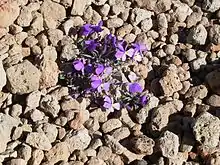| Teide violet | |
|---|---|
 | |
| Scientific classification | |
| Kingdom: | Plantae |
| Clade: | Tracheophytes |
| Clade: | Angiosperms |
| Clade: | Eudicots |
| Clade: | Rosids |
| Order: | Malpighiales |
| Family: | Violaceae |
| Genus: | Viola |
| Species: | V. cheiranthifolia |
| Binomial name | |
| Viola cheiranthifolia Humb. & Bonpl. | |
Viola cheiranthifolia is a species of the genus Viola.[1] It is also known as the Teide violet and Teide daisy.
This plant is exclusively found in the dry and stony caldera of the volcano Teide on the Canary Island of Tenerife. It survives there in altitudes of 2000-3000m. Most of the time it is hiding under the rocks. It is only visible for three weeks in spring, when it comes out to the surface for pollination.
It reaches heights of 6 to 7 inches. The violet of the Teide is the plant that blooms to greater height of all Spain, can even be observed in the own crater of the Teide.
References
- ↑ Priscila Rodríguez-Rodríguez; Alejandro G. Fernández de Castro; Jaume Seguí; Anna Traveset; Pedro A Sosa (2019). "Alpine species in dynamic insular ecosystems through time: conservation genetics and niche shift estimates of the endemic and vulnerable Viola cheiranthifolia". Annals of Botany. 123 (3): 505–519. doi:10.1093/aob/mcy185. ISSN 1095-8290. PMC 6377099. PMID 30307538.
This article is issued from Wikipedia. The text is licensed under Creative Commons - Attribution - Sharealike. Additional terms may apply for the media files.